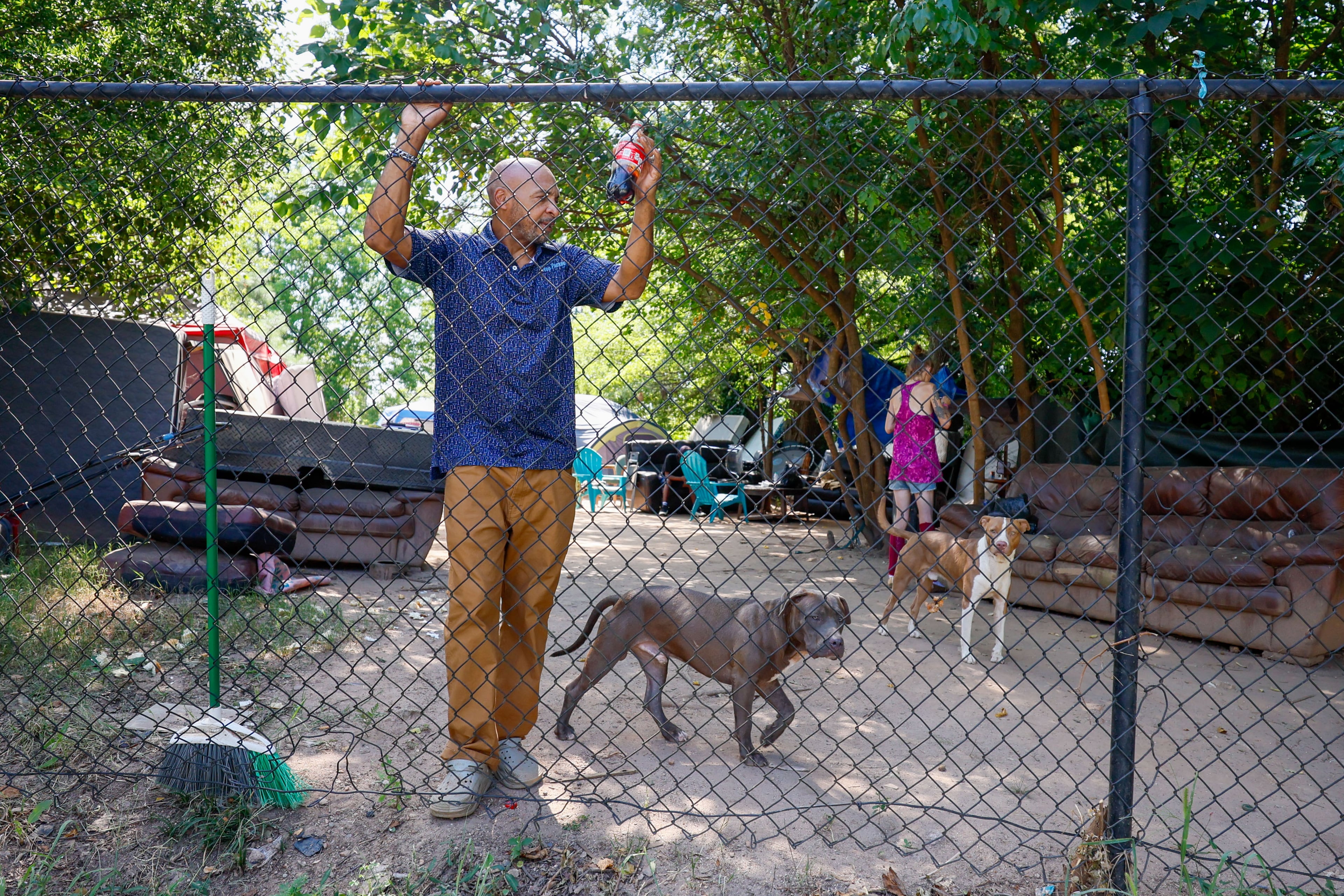Proposed cuts could make housing homeless people harder, advocates say

Willie Jeffries spent four years living in a large homeless camp in Atlanta’s Mechanicsville neighborhood. He finally received housing in October but was evicted roughly six months later for violating the stringent terms of his lease agreement.
On the first day of his return to homelessness, Jeffries said he visited an encampment in the same neighborhood where he had been living in a tent last year — just off Cooper Street Southwest. He didn’t sleep there that first night but stopped by because someone in the camp had a tent for sale.
“They want $25, and I don’t have that,” said Jeffries when reached by phone that day, May 9, while killing time near Cooper Street and trying to decide his next move. “It‘s been six months since I had been out here. I’ve pretty much got to get back into it.”
Jeffries, 60, ended up spending the next several nights sleeping in a truck borrowed from a friend.
He and 43 other people who used to live in the sprawling Cooper Street camp received “rapid rehousing” after the city closed the camp in October. The area of the encampment was cleared and fenced off to make way for a development that will include housing for more than 100 people who used to be homeless.

Rapid rehousing is a program that offers rental assistance for up to two years and case management services. It is designed to help someone experiencing homelessness by giving them a place to live for a set period of time, often without having to pay rent and utilities. The hope is that they can get a job and eventually pay those expenses.
Advocates for the homeless population emphasize that it takes some people, like Jeffries, more than one housing placement before they find the right fit. They fear the problem might get even worse, given President Donald Trump’s proposal for massive cuts to programs that play a role in local efforts to prevent homelessness.
“Rapid rehousing is also a very challenging housing intervention,” said Cathryn Vassell, chief executive officer of Partners for HOME, the nonprofit that works with the city of Atlanta on its strategy to reduce homelessness.
“There’s less-intensive supports provided, and yet we’re sometimes housing people that are highly vulnerable in what‘s designed to be a more independent — ultimately self-sufficient — intervention,” Vassell said in an interview this month.

Vassell said cities like San Francisco and Denver have many more resources dedicated to stemming homelessness.
“These are incredibly resource-rich communities with Medicaid expansion and county mental health at the table and all kinds of funding mechanisms to support that work of stabilizing somebody in housing,” she said.
“We’re operating on a shoestring and desperately trying to get people out of a very unsafe and terrible situation of being unsheltered and homeless and then trying to make sure they are stabilizing in housing and being a good neighbor and being a good tenant and all those things that collide.”
The Trump administration has proposed a $33.6 billion cut to funding for the U.S. Department of Housing and Urban Development, a funding decrease of nearly 44%, and allowing states to design their own rental assistance programs.
U.S. Housing and Urban Development Secretary Scott Turner called the proposal bold and said it would reimagine how the federal government addresses affordable housing and community development.
“It creates the opportunity for greater partnership and collaboration across levels of government by requiring states and localities to have skin in the game and carefully consider how their policies hinder or advance goals of self-sufficiency and economic prosperity,” Turner said in a statement.
The White House recommendations for the fiscal year 2026 budget also call for cutting $532 million by consolidating the Continuum of Care Program and Housing Opportunities for Persons with AIDS into an Emergency Solutions Grant program that provides short-term housing assistance, capped at two years for homeless individuals.
The proposal also includes eliminating the Community Development Block Grant program and the HOME Investment Partnerships Program, which provides grants to state and local governments to create affordable housing for low-income households.
“Less people will be housed, and more people will be forced into homelessness” if Trump’s proposed cuts take effect, said Donald Whitehead Jr., executive director of the National Coalition for the Homeless.
Referring to Jeffries and others like him, Whitehead added: “His path is exacerbated by these cuts. It‘s going to make it a lot harder for him to be rehoused.”
In Atlanta, one of Partners for HOME‘s key goals is to move people experiencing homelessness into “permanent housing,” which includes rapid rehousing, as quickly as possible, and into the right program for the individual, Vassell said. The term “permanent housing” does not guarantee someone a home for life. It usually involves an initial term of at least one year that is renewable for no less than one month.
Permanent supportive housing involves long-term leases or rental assistance and consistent supportive services for issues like mental illness and substance use. Studies have shown its effectiveness, but it also costs more than other types of housing over time.
“If somebody is chronically homeless, then we’re trying to get them into permanent supportive housing,” Vassell said. “If they are not chronic, then we are using other tools like rapid rehousing.”
If Partners for HOME doesn’t have sufficient permanent housing options available on the day of an encampment closure, “then we are rallying (emergency) shelter as an interim solution while that person works on their housing solution from shelter.”
About 75% of people who leave rapid rehousing in Atlanta either stay housed or exit to a permanent destination, like living with family, in the first two years, according to Vassell.
“Shelter is a very challenging environment to document outcomes in general, and transitional housing is as well,” Vassell said. “Whether someone is moving to housing or if they’re going back to homelessness, they’re oftentimes not doing an exit interview with the shelter (or) transitional housing program.
“Even if they get housing or they move back in with family, they might be gone even if you were expecting them back the same day, and they’re not calling you back to tell you where they went and whether it was a positive exit or not.”
How difficult it is for someone to transition from living in a homeless encampment to an apartment, of course, depends on the individual.
“Sometimes a person gets in and they’re able to stay for as long as they have a lease or as long as they have a subsidy,” Whitehead said. “Other people will have to be relocated for various reasons.”
He added: “It is often a sizable adjustment for people who have been living outdoors for various lengths of time to adjust to living in an apartment, for a number of reasons.”
These include problems getting along with neighbors in an apartment complex and issues such as substance use, advocates say.

Jeffries said he was evicted this month for violating his lease, including for letting people sleep there without getting them approved first and for having people over and making noise. His landlord declined to discuss the specifics of Jeffries’ eviction.
Case managers for people experiencing homelessness say some of their clients make a point of following their lease agreements to the letter, knowing that homelessness awaits if they don’t do so. Others still spend time in the encampments they used to live in, making it hard to leave their friends behind and return to their apartments alone.
Jeffries said he let people spend the night in his apartment when it was too cold for them to sleep outdoors because friends had done the same for him when he was homeless.
“It‘s very understandable,” Whitehead said. “People go to encampments because they are attempting to find a sense of community. When they get a roof over their head, it‘s a very natural, compassionate thing to try to ensure that other people in that community are safe from the elements and any kind of human danger.”
On the day of Jeffries’ eviction, a friend agreed to keep some of his belongings for him and loaned Jeffries his truck to move them out of the apartment.
Jeffries had found work as a handyman but said he owed people money and didn’t have any left by the time he was evicted. He was planning to call his mother in California to see if she could send him some.
Despite his recent struggles, Jeffries takes pride in some of the positive changes he has made in his life. He said he stopped using hard drugs like cocaine and heroin 38 years ago, quit drinking about six years ago and hasn’t been incarcerated since 2003.
Now that Jeffries is back on the street, he is hoping for another chance at housing.
“If I go to another place,” he said, ”I’ll do the right thing this time."



